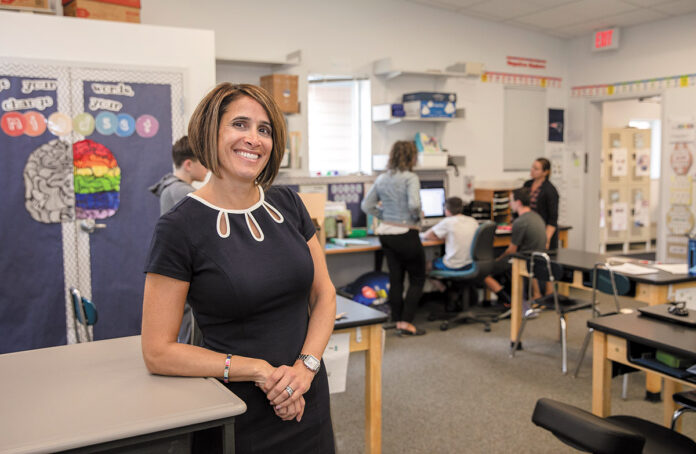
2019 PBN Business Excellence Awards
EXCELLENCE IN EDUCATION AND LEARNING: The Wolf School
When Ben was a young child, his mother was told he would never be able to read. That was before he was enrolled as a second grader at The Wolf School, in East Providence. This fall, years later, Ben is in a graduate program in creative writing at Columbia University.
According to school leaders, these sorts of transformations are common at The Wolf School, a private K-8 special education school that caters to “complex learners.” The school’s mission is to change the trajectory of these students’ lives.
Students are high-functioning but have multiple diagnoses, making learning in traditional classrooms a challenge. Students may be on the autism spectrum, or have anxiety, attention deficit hyperactivity disorder, executive function difficulties or speech and language processing issues.
“There’s no real one type of student or profile,” Head of School Anna Johnson said.
Complex learners, according to research, are more likely to be bullied, drop out of school, or fail in the workplace. Indeed, many of the students who transfer to Wolf have “pretty severe school trauma” after spending years in traditional schools, said Marcie Haines, who teaches second and third grade at Wolf.
“Where they would end up if they hadn’t come here, who knows,” Johnson said. “But the journey is changing, and the story is different from where they started once they get here.”
The school uses an immersion model. Every classroom has a special education teacher, an occupational therapist, a speech therapist and teaching assistants to help students. The special education teacher guides the curriculum, and occupational and speech therapists embed their own goals within the lessons.
“Rather than send the kid down the hall for 30 minutes and then go back into the classroom, they’re getting a lot of intensive therapy in the classroom all the time,” said Johnson.
‘The culture, the climate, the positivity and hard work are really making a difference.’
ANNA JOHNSON, The Wolf School head of school
This model requires staff to take a team-based approach to education.
“You have to collaborate on every single goal together,” Haines said. “We have weekly meetings; we’re constantly in contact on email every night to make sure we’re all following through on the same things.”
The school’s data suggests the approach is working. All of Wolf School’s 160 graduates have gone on to high school; 83% of them have enrolled in college.
Demand for the school’s services has increased, as well. Since opening in 1999 with three students, The Wolf School now has 65 students from Rhode Island and Massachusetts in eight classrooms. Families have relocated from as far away as Florida, California and Pakistan to enroll their children.
Part of the school’s approach involves giving parents the tools they need to continue the students’ education at home. Staff members host monthly parent cafes, send out a weekly newsletter and call families weekly.
“We try to make sure there’s a lot of communication with families so they can reinforce the same things we’re talking about here,” Johnson said. “Without that piece, the students wouldn’t be as successful as they are.”
There’s also an effort to inform the larger community about complex learners. The Wolf School hosts a spring speakers series and an annual Complex Learners Conference, where prominent researchers discuss teaching and raising children with learning difficulties. The theme of this year’s conference is screen time and social media.
Like many schools, The Wolf School is grappling with how best to navigate social media’s influence on children. The issue is even more complicated at Wolf, since many students struggle to balance their emotions and navigate social norms. Administrators and staff implemented a digital citizen curriculum, hiring a part-time clinician to observe students in the classroom and having an open dialogue with parents and students about digital norms such as texting and Instagram.
Then again, overcoming challenges is just another day at The Wolf School.
“Wolf is a magical place. The culture, the climate, the positivity and hard work are really making a difference in the lives of these families and students,” Johnson said.










